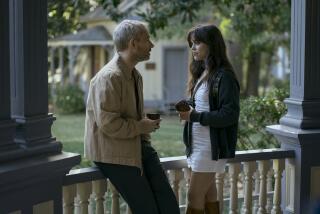Is ‘Thoroughbred’ the nastiest pleasure of the young film year?
The “Thoroughbred” filmmaker Cory Finley realizes some people may come away with a certain impression of him after seeing his movie.
“I appreciate people’s concern,” Finley said wryly when asked how he feels when moviegoers approach him post-screening with a worried look in their eyes. Then, turning serious, he added, “The impulse to write this story started inward, in myself, critiquing things about my own experience that feel difficult.”
Viewers would have reason to feel a little concerned — and impressed — by what they see.
At 28, Finley has created one of the film world’s freshest and nastiest works, an outre pleasure that is both a cool dissection of young people and a portrait of them from within.
Premiering several weeks ago at the Sundance Film Festival and bound for indie-world buzz in the months ahead, “Thoroughbred” examines the more narcissistic side of (a certain kind of) youth, giving what amounts to an honest appraisal in a stylized context. It’s the sort of movie whose vision makes it hard to ignore, even as its morally ambiguous message makes consensus equally difficult. (Focus Features bought the film at the festival and will release it commercially later this year.)
Starring a pair of early-twentysomething, England-raised actors in Anya Taylor-Joy and Olivia Cooke, the movie tells of two bored boarding-school types, Amanda and Lily, who reprise what might best be called a frenemy-ship after Amanda is expelled from her high school for a brutal act involving a horse. (Both play American teenagers.)
Soon they are united by a common enemy — Lily’s stepfather (Paul Sparks), who becomes a focal point for an evil but possibly necessary plot.
When the duo hires a jittery small-time stoner and sex offender — Anton Yelchin, in one of his final roles, and also one of his finest — things go even more awry. The resulting tale is a blackly comic noir with overtones of “Heathers” and “Cruel Intentions” but a style — and modernity — all its own.
“There’s an aspect that I hope is a cautionary tale,” Finley said of the film, which was shot and set in a tony part of Connecticut. “It functions a bit as social satire,” he added, even with the elements “that embrace genre and big crazy plot moments.”
“At its core for me, it’s about questions of empathy and right and wrong and issues of wealth and privilege,” he said.
Finley initially wrote the piece as a play but never produced it, then decided it would have more sizzle as a screenplay. The first-timer, who uses a pop-percussive score to counterpoint the droll violences on screen, had gained notoriety after moving from St. Louis to New York a few years back and staging “The Feast,” a kind of existentially themed work set around a plumbing problem — the New York Times said it could feel like “a soap opera with H. P. Lovecraft as script supervisor.”
Finley’s film rests in part on the chemistry and performance of its two actors, who seem to have a deeply shared history from the moment they appear. Taylor-Joy and Cooke — two emerging talents thanks to “The Witch” and “Barry” (Taylor-Joy) and “Bates Motel” and “Me and Earl and the Dying Girl” (Cooke) — worked carefully on that dynamic.
“We became very reactive of each other and very aware of each other [so it became] like a two-hander, moving in sync,” Cooke said.
“We melded into the same being,” said Taylor-Joy.
They acknowledged that some of the real-life commentary was on-point, even if that meant indicting their own generation.
“There’s that line in that film that Paul Sparks says to Anya’s character that ‘we are all offshoots of your consciousness, all your maids, all your personal trainers.’ That’s very fair to say of our age group,” Cooke said. “The millennials, I think, are one half so super-aware and the other half, the social media half, that have used that to go inwards and put [them] at the center of a world and never look out.”
Much of what’s notable about the story is that it focuses on two people who never say and do what you expect — never say and do what society expects — even as their behavior feels uncomfortably closer to how many of us might think
“We’re presenting you with two dark women,” Taylor-Joy said. But, she added,” everyone has dark impulses within them.”
Finley said the story came from his own psyche — from “uncomfortable questions about my own moral instincts and how I process the world” — only covered up by a thin veil.
“There’s something appealing in writing characters that had a lot of me and a lot of darker, thornier, nastier sides of myself but live in a different world and are a different age and gender. Those distancing factors made it easier to put it in terms that felt more dangerously personal.”
He added,” I hope audiences see more of themselves than they’d like to.”
See the most-read stories in Entertainment this hour »
Twitter: @ZeitchikLAT
More to Read
Only good movies
Get the Indie Focus newsletter, Mark Olsen's weekly guide to the world of cinema.
You may occasionally receive promotional content from the Los Angeles Times.







